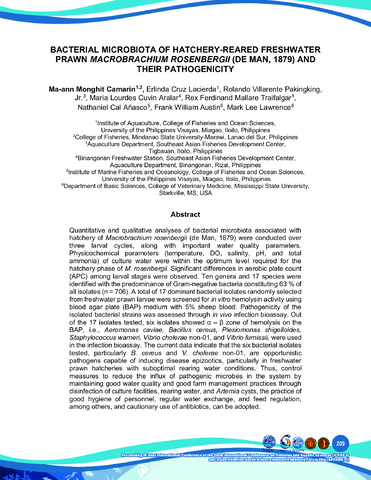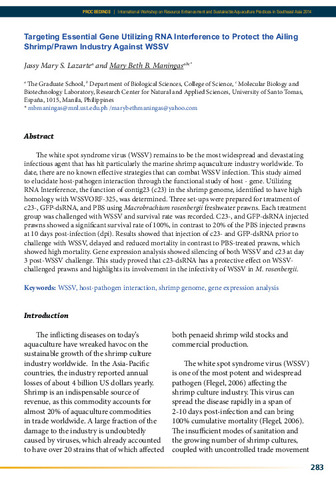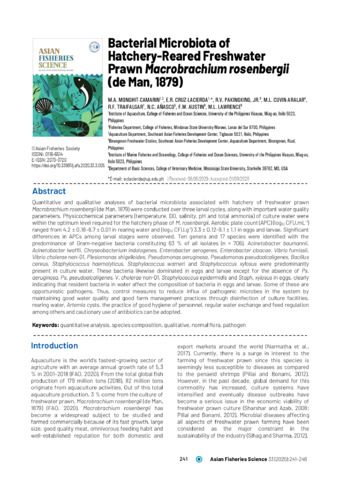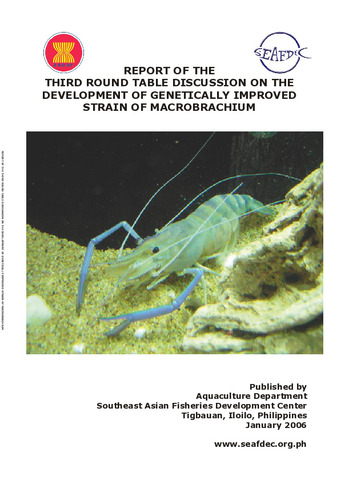Bacterial microbiota of hatchery-reared freshwater prawn Macrobrachium rosenbergii (De Man, 1879) and their pathogenicity
- Global styles
- MLA
- Vancouver
- Elsevier - Harvard
- APA
- Help

View/
Date
2022Author
Page views
271ASFA keyword
AGROVOC keyword
Taxonomic term
Metadata
Show full item record
Share
Abstract
Quantitative and qualitative analyses of bacterial microbiota associated with hatchery of Macrobrachium rosenbergii (de Man, 1879) were conducted over three larval cycles, along with important water quality parameters. Physicochemical parameters (temperature, DO, salinity, pH, and total ammonia) of culture water were within the optimum level required for the hatchery phase of M. rosenbergii. Significant differences in aerobic plate count (APC) among larval stages were observed. Ten genera and 17 species were identified with the predominance of Gram-negative bacteria constituting 63 % of all isolates (n = 706). A total of 17 dominant bacterial isolates randomly selected from freshwater prawn larvae were screened for in vitro hemolysin activity using blood agar plate (BAP) medium with 5% sheep blood. Pathogenicity of the isolated bacterial strains was assessed through in vivo infection bioassay. Out of the 17 isolates tested, six isolates showed α – β zone of hemolysis on the BAP, i.e., Aeromonas caviae, Bacillus cereus, Plesiomonas shigelloides, Staphylococcus warneri, Vibrio cholerae non-01, and Vibrio furnissii, were used in the infection bioassay. The current data indicate that the six bacterial isolates tested, particularly B. cereus and V. cholerae non-01, are opportunistic pathogens capable of inducing disease epizootics, particularly in freshwater prawn hatcheries with suboptimal rearing water conditions. Thus, control measures to reduce the influx of pathogenic microbes in the system by maintaining good water quality and good farm management practices through disinfection of culture facilities, rearing water, and Artemia cysts, the practice of good hygiene of personnel, regular water exchange, and feed regulation, among others, and cautionary use of antibiotics, can be adopted.
Suggested Citation
Monghit-Camarin, M., Cruz-Lacierda, E., Pakingking, Jr., R. V., Cuvin-Aralar, M. L., Traifalgar, R. F. M., Añasco, N. C., Austin, F. W., & Lawrence, M. L. (2022). Bacterial microbiota of hatchery-reared freshwater prawn Macrobrachium rosenbergii (De Man, 1879) and their pathogenicity. In A. J. G. Ferrer (Ed.), Proceeding of Joint International Conference of the Sixth International Conference on Fisheries and Aquatic Sciences (ICFAS 6) and Asian Fisheries Social Science Research Network Forum One (AFSSRN F1), 24-26 November 2021, via Zoom, Miagao, Iloilo, Philippines (pp. 209–215). University of the Philippines Visayas.
Type
Conference paperISBN
9786218285125Collections
- Conference Proceedings [299]
Related items
Showing items related by title, author, creator and subject.
-
Targeting essential gene utilizing RNA interference to protect the ailing shrimp/prawn industry against WSSV
Lazarte, Jassy Mary S.; Maningas, Mary Beth B. (Aquaculture Department, Southeast Asian Fisheries Development Center, 2015)The white spot syndrome virus (WSSV) remains to be the most widespread and devastating infectious agent that has hit particularly the marine shrimp aquaculture industry worldwide. To date, there are no known effective ... -
Bacterial microbiota of hatchery-reared freshwater prawn Macrobrachium rosenbergii (de Man, 1879)
Monghit-Camarin, Ma-Ann A.; Cruz-Lacierda, Erlinda R.; Pakingking, Rolando V., Jr. ; Cuvin-Aralar, Maria Lourdes; Traifalgar, Rex Ferdinand; Añasco, Nathaniel C.; Austin, F. W.; Lawrence, M. L. (Asian Fisheries Society, 2020-09-30)
Quantitative and qualitative analyses of bacterial microbiota associated with hatchery of freshwater prawn Macrobrachium rosenbergii (de Man, 1879) were conducted over three larval cycles, along with important water quality ...
; Cuvin-Aralar, Maria Lourdes; Traifalgar, Rex Ferdinand; Añasco, Nathaniel C.; Austin, F. W.; Lawrence, M. L. (Asian Fisheries Society, 2020-09-30)
Quantitative and qualitative analyses of bacterial microbiota associated with hatchery of freshwater prawn Macrobrachium rosenbergii (de Man, 1879) were conducted over three larval cycles, along with important water quality ... -
Report of the third round table discussion on the development of genetically improved strain of Macrobrachium, Bangkok, Thailand 3-4 December 2005
Southeast Asian Fisheries Development Center, Aquaculture Department (Aquaculture Department, Southeast Asian Fisheries Development Center, 2006-01)In order to continue assessing the progress and status of the activities in the participating countries, the Third Roundtable Discussion was held in Bangkok, Thailand from 3 to 4 December 2005 in order to: 1) assess the ...





